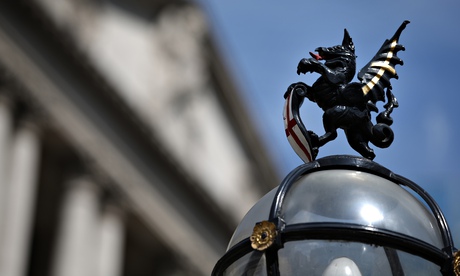The governor of the Bank of England has warned interest rates might start to rise before workers see a sustained real-terms pick up in their pay.
Signalling further pain for households, Mark Carney said it was possible that borrowing costs – on hold at 0.5% for more than five years – would increase before wage growth catches up with inflation.
"We have to have the confidence that real wages are going to be growing sustainably [before rates go up]. We don't have to wait for the fact of that turn to do so," Carney said in an interview with The Sunday Times.
Inflation has outpaced wage growth for the vast majority of the period since 2008, bringing a prolonged period of falling real pay and living standards for UK workers.
Last week the Bank's rate-setting Monetary Policy Committee slashed its forecast for pay growth by half to 1.25% by the end of 2014, as wage rises have failed to materialise despite rapidly rising employment.
With inflation expected to be just below the 2% target by the end of 2014, average real pay is expected to fall for the rest of the year, with rises not expected until 2015.
Markets are forecasting a first rate rise in early 2015, and the pound has strengthened in recent weeks as investors bet that Threadneedle Street will be the first major central bank to raise rates.
Carney said he would be "comfortable" being the first to move. "We will do what we need to do."
Hinting at the growing division among MPC members over the appropriate timing of the first hike, Carney said: "In terms of our broader message, and where the committee is united and has the same view, is that as the expansion continues, rates are going to go up," he said. "People might have different views on the exact timing, but it will happen and people should plan accordingly. Second, our best judgment of the path is that it will be limited and gradual, a new normal if you will."
"It is entirely healthy for people to have different views on the committee and it is to be expected at a time when decisions become more finely balanced."
Almost half of economists polled by Reuters expect the minutes of the August meeting of the MPC, published this coming Wednesday, to show that at least one of the nine-strong committee voted for a rate hike. Victoria Clarke, economist at Investec, said there was "a good chance that at least one MPC member" voted for a rate rise.
It would be the first time the committee has been split over interest rates since July 2011, when Martin Weale and Spencer Dale both voted for a 0.25 percentage point increase. They were outvoted.
Carney said economic repair in the UK was "much more than halfway towards that finish line". He cautioned, however, that the most difficult part of Britain's recovery lay ahead.
"The easy bit of the expansion has happened. Now we are coming to the tougher part where you ultimately have to see productivity pick up, real wages pick up, sustainable consumption and export competitiveness return. That's what we are providing guidance for now.
"There are multiple headwinds for the British economy: a very weak Europe, the persistent strength of the pound, continued fiscal consolidation which will subtract from growth and British households that are still heavily indebted, not least because they haven't seen real wages increase," he said.



















